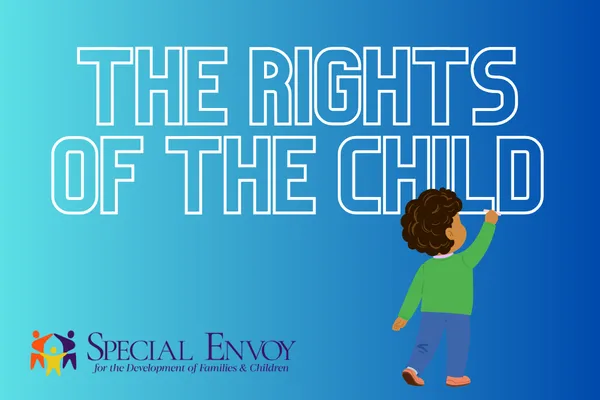Welcome to Our Blogs
INCREASE YOUR AWARENESS
Follow along as we share valuable knowledge and content to enrich and empower your everyday life.

The Rights of the Child
The Rights of the Child
Children and young people have the same general human rights as adults and also specific rights that recognize their special needs. Children are neither the property of their parents nor are they helpless objects of charity. They are human beings and are the subject of their own rights.

Children are individuals
Children are neither the possessions of parents nor of the state, nor are they mere people-in-the-making; they have equal status as members of the human family.
Children start life as totally dependent beings
Children must rely on adults for the nurture and guidance they need to grow towards independence. Such nurture is ideally found from adults in children's families, but when primary adult caregivers cannot meet children's needs, it is up to the State as the primary duty bearer to find an alternative in the best interests of the child.
Children are impacted strongly in society
Practically every area of government policy – from education to public health – affects children to some degree. Short-sighted policymaking that fails to take children into account has a negative impact on the future of all members of society.
The healthy development of children is crucial
Because they are still developing, children are especially vulnerable – more so than adults – to poor living conditions such as poverty, inadequate health care, nutrition, safe water, housing, and environmental pollution. The effects of disease, malnutrition, and poverty threaten the future of children and therefore the future of the societies in which they live.
Children’s views in politics should be considered
Children generally do not vote and do not traditionally take part in political processes. Without special attention to the opinions of children – as expressed at home and in schools, in local communities and even in governments – children's views go unheard on the many important issues that affect them now or will affect them in the future.

These four principles contribute to a general attitude towards children and their rights. They are based on the notion that children too are equal as human beings.
One general principle as identified by the committee on the rights of the child is that all children should enjoy their rights and should never be subjected to any discrimination. The obligation to provide equality of opportunities among children is expressed in Article 2, the first paragraph of which reads: "States parties shall respect and ensure the rights set forth in the present convention to each child within their jurisdiction without discrimination of any kind, irrespective of the child's parents or legal guardian, race, color, sex, language, religion, political or other opinion, national, ethnic or social origin, poverty, disability, birth or other status."

Best interests of the child Children, especially when they are very young, are vulnerable and need special support to be able to enjoy their rights fully. How could children be granted equal rights and at the same time the necessary protection? Part of the answer lies in the principle of the best interest of the child, formulated in Article 3:1. "In all actions concerning children whether undertaken by public or private social welfare institution, courts of law, administrative authorities or legislative bodies, the best interest of the child shall be a primary consideration."

The principle most directly related to children's economic and social rights is formulated in the right to life article. The article goes further than just granting children the right not to be killed; it includes the right to survival and development which is formulated in Article 6:2 and states thus: "State parties shall ensure to the maximum extend possible the survival and development of the child."

A crucial dimension of the convention is expressed through another principle, the one about respecting the views of the child. In order to know what is actually in the interest of the child it is logical to listen to him or her. The principle is formulated in Article 12:1 which states that "States parties shall assure to the child who is capable of forming his or her own views the rights to express those views freely in all matters affecting the child, the view of the child being given due weight in accordance with the age and maturity of the child.
Sources:
UNICEF. (2019, June 4). Child rights and why they matter. Child Rights. https://www.unicef.org/armenia/en/stories/child-rights-and-why-they-matter
UNICEF. (2019, June 24). Four principles of the convention on the rights of the child. https://www.unicef.org/armenia/en/stories/four-principles-convention-rights-child
@ Copyright 2026 - Special Envoy for the Development of Families & Children| All rights reserved

